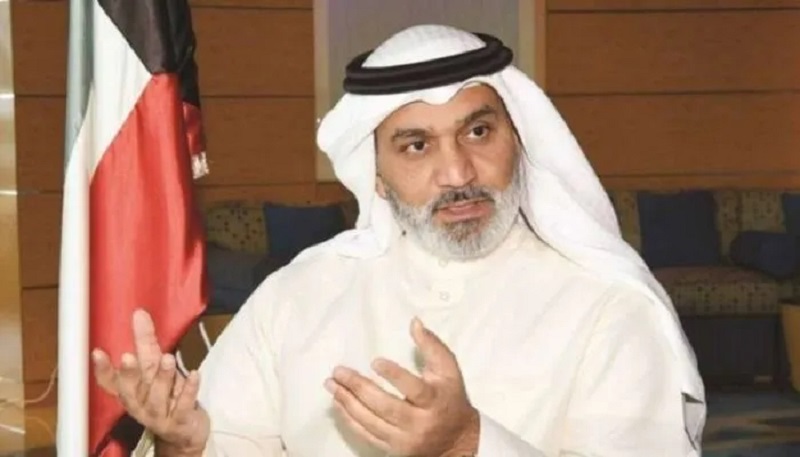Economy
Underinvestment, Not OPEC to Blame for Inflation—Al Ghais

By Adedapo Adesanya
The new Secretary-General of the Organisation of the Petroleum Exporting Countries (OPEC), Mr Haitham Al Ghais, has said the group is not to blame for soaring inflation, pointing the finger instead at chronic underinvestment in the oil and gas industry.
In an interview with CNBC’s Hadley Gamble, he said, “OPEC is not behind this price increase.”
“There are other factors beyond OPEC that are really behind the spike we have seen in gas [and] in oil. And again, I think in a nutshell, for me, it is underinvestment — chronic underinvestment,” he added.
“This is the harsh reality that people have to wake up to and policymakers have to wake up to. Once that is realized I think then we can start to think of a solution here. And the solution is very clear. OPEC has a solution: invest, invest, invest,” Mr Al Ghais said.
Asked whether OPEC, which produces roughly 40 per cent of the world’s oil output, should shoulder the blame for surging energy prices driving up inflation, Al Ghais replied: “No, absolutely not. I mean it’s all relative, that’s number one.”
“Number two is OPEC is doing its part. We have been increasing production in line with what we see and a gradual mechanism that has been very transparent … We are doing everything we can to bring the market back to balance but there are economic factors that are really beyond OPEC’s control,” he added.
Al Ghais had echoed other proponents including Nigeria’s Minister of State for Petroleum Resources, Mr Timpre Sylva, who said the reason the country was not producing enough was due to the dearth in investment.
“In the last 10 years, over $70 billion worth of investments came to Africa, but sadly less than $4 billion came to Nigeria.
“Surprisingly, we are the biggest in Africa. If we cannot attract investments to Nigeria, you know where we are heading,” he said as the country tried to woo the European Union to consider Nigeria as an alternative gas market.
Mr Al Ghais was appointed for a three-year term as OPEC’s secretary general to succeed Nigerian oil industry veteran Mohammad Barkindo, who died at the age of 63 last month just days before he was due to step down from the organisation.
He also noted that the group has a “solid” relationship with Russia and it always seeks to separate politics from its market stabilizing objectives.
“First of all, if you look at history, if I may, such challenges are not new to OPEC and the OPEC history,” Mr Al Ghais said, citing the Iran-Iraq war in the 1980s and the invasion of Kuwait in 1990.
“We try always in our meetings to separate the politics and the political aspects from what we do in terms of managing the market balance and in terms of what we do as OPEC+, I think the methodology is clear,” he continued.
“Russia’s leadership in supporting the declaration of cooperation has been clear since day one, since 2017. The relationship is solid in terms of managing the market.”
Asked whether this means that he trusts Russia, Mr Al Ghais replied: “Yes.”
Economy
Dangote Refinery Shares to be Available to Public in Five Months

By Adedapo Adesanya
The chairman of Dangote Group, Mr Aliko Dangote, has said that within the next five months, Nigerians should be able to purchase shares of Dangote Petroleum and Refinery.
Mr Dangote made this revelation on Sunday during a tour of the facility by the chief executive of the Nigerian National Petroleum Company (NNPC) Limited, Mr Bayo Ojulari, alongside members of the company’s executive management.
The $20 billion refinery is the largest single-train refinery in the world with 650,000 barrels per day refining capacity. There are efforts to boost the capacity to 1.4 million barrels per day soon.
Speaking with journalists, Mr Dangote said, “And the other issue is that they (NNPC) are holding 7.25 per cent of the shares that we have here, which is more than the shares Elon Musk has in Tesla. And they are holding that on behalf of Nigerians,” he said.
“So individually, Nigerians too will have an opportunity in the next, maybe a maximum of four to five months. There will actually be an opportunity to buy the shares.”
He added that shareholders will have the option to receive their dividends in either naira or dollars, as the refinery also earns in dollars.
Commenting on Mr Ojulari’s visit, the billionaire businessman said the NNPC, represented by Mr Ojulari and its management team, was not just a guest but a shareholder.
“Today is really our best day ever” at the facility. I know NNPC invested in us when we were not really sure whether the refinery would be successful.
“So that’s the kind of level of confidence. But right now, the relationship with the new set of people that we have at NNPC, I think the sky is the limit, and we will cooperate and also make sure that we work together to make sure that we make Nigerians proud.”
Speaking on prospects of partnership with NNPC in the upstream sector, he said, “We have block 71, 72, but we’re going to look much deeper”.
“Most likely, depending on our own discussions with them, we will partner with them, maybe in some of the upstream. They, too, will partner with us here because here is not just a refinery, it’s an industrial hub.
“And that’s why we’re doing linear alkaline benzene, which is a raw material for detergents, ” he added.
Economy
NGX Investigates Zichis Stocks After 859% Rise in One Month

By Aduragbemi Omiyale
The Nigerian Exchange (NGX) Limited has launched an investigation into trading activities on the shares of Zichis Agro-Allied Industries Plc.
A notice from Customs Street on Monday disclosed that this has led to the suspension of the company for now.
This development comes about a month after Zichis was listed on the domestic bourse and placed in the growth board of the NGX.
In the circular, it was disclosed that the suspension may be lifted after the conclusion of the findings, but for now, investors will not be able to trade the organisation’s securities on the NGX platform.
“The suspension of trading in Zichis shares shall be lifted upon the conclusion of an investigation into the trading activities on the company’s shares,” a part of the disclosure stated.
The bourse explained that it wielded the big stick on Zichis in compliance with Rule 7.0, Rules on Suspension of Trading in Listed Securities, Rulebook of The Exchange (Issuers’ Rules).
This part of the law states that, “Notwithstanding any of the foregoing provisions, the exchange may, in accordance with any of its rules, place the trading of any security on suspension.
“It may also do so if it is of the view that such suspension will be in the interest of the investing public and in accordance with the SEC Rules.”
In announcing the action on the firm, the NGX declared that, “The shares of Zichis Agro-Allied Industries Plc have been suspended from trading on the facilities of Nigerian Exchange Limited (NGX), effective today, Monday, February 23, 2026.”
Business Post reports that last week, shares of Zichis appreciated by 60.74 per cent to N17.36. It joined the stock exchange at N1.81, indicating it has gained N15.55 or 859.12 per cent in one month.
Economy
Nigeria Investment Fund, Japan Unveil $50m Innovation Fund for Startups

By Adedapo Adesanya
The Nigeria Investment Authority (NSIA) and Japan International Cooperation Agency (JICA) have finalised agreements to launch a $50 Sovereignmillion impact innovation fund aimed at strengthening the Nigerian start-up ecosystem.
The fund is expected to provide patient capital to pre-seed, seed, and early-stage startups addressing critical social challenges in sectors such as agriculture, healthcare, education, energy, waste and water management.
JICA will provide $14 million in grant support, while NSIA contributes up to $20 million to match the grant.
Structured as an onshore public fund, the initiative combines financial support with technical assistance to help startups refine products, scale operations, and expand into new markets.
The fund is expected to create jobs, improve livelihoods, and contribute to sustainable economic development across Nigeria.
Speaking at the agreement signing ceremony between NSIA and JICA at the Ministry of Budget and Economic Planning, Mr Aminu Umar-Sadiq, the chief executive of NSIA, said: “The Fund represents a transformative step for Nigeria’s startup ecosystem. By providing early-stage ventures in high-impact sectors with the capital and support they need to grow, we are enabling innovators to tackle some of Nigeria’s most pressing challenges. Our collaboration with JICA underscores our commitment to entrepreneurship, inclusive growth, and sustainable development.”
Preparations are underway to operationalise the Fund and develop a pipeline of high-impact startups ready for investment. NSIA remains committed to advancing socio-economic development through strategic partnerships that scale impact, expand innovative solutions, and unlock access to capital.
On his part, the Japanese Ambassador to Nigeria, Mr Suzuki Hideo, said, “The Government of Japan hopes this new project will take root in Nigeria and bear fruit swiftly.”
-

 Feature/OPED6 years ago
Feature/OPED6 years agoDavos was Different this year
-
Travel/Tourism10 years ago
Lagos Seals Western Lodge Hotel In Ikorodu
-

 Showbiz3 years ago
Showbiz3 years agoEstranged Lover Releases Videos of Empress Njamah Bathing
-

 Banking8 years ago
Banking8 years agoSort Codes of GTBank Branches in Nigeria
-

 Economy3 years ago
Economy3 years agoSubsidy Removal: CNG at N130 Per Litre Cheaper Than Petrol—IPMAN
-

 Banking3 years ago
Banking3 years agoSort Codes of UBA Branches in Nigeria
-

 Banking3 years ago
Banking3 years agoFirst Bank Announces Planned Downtime
-

 Sports3 years ago
Sports3 years agoHighest Paid Nigerian Footballer – How Much Do Nigerian Footballers Earn

















